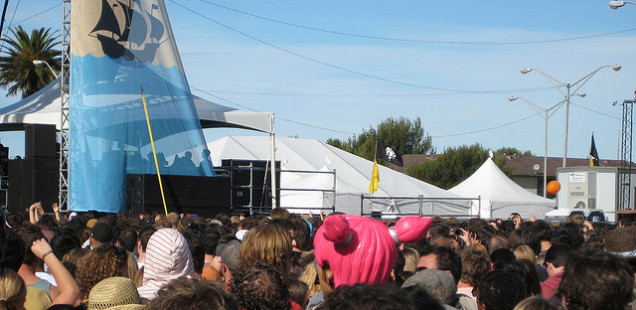Hipsters vs Pirates. Is there a difference? | PirateTimes

Hipsters vs Pirates. Is there a difference?
Hipsters
Hipsters were born from the counter-culture. In the past decade the hipster movement has grown and has gradually moved from periphery into the mainstream of society. When punk became plastic and the hip hop lost their momentum for social change, the remaining counter-cultures merged together into a single, continuously mutating trans-atlantic melting pot of styles, tastes and habits, which can be described as a hipster movement, explains Douglas Haddow.
Hipsters are a subculture, formed of young adults in the 20s and 30s, who value independent thinking, progressive politics and have a strong affection for ‘irony’ and ‘pastiche’ (love of old, re-creating old patterns, especially in design). They are also quite often marked with a certain degree of douchebaggery, which in most cases is just a stereotype. Some of those negative connotations often come from misunderstanding or hatred.
In this, hipsters are very similar to Pirates, so it’s time to unmask why hipsters can actually be considered Pirates:
Hipster culture is strongly linked with technology
Without Apple products, hipsters probably would have acted very differently. Not because of the products themselves, but because of all possibilities the technology offers. Powerful laptops made graphic design and video editing easy. Gadgets such as iPod’s have allowed easy access to large music and video libraries, where people can find more about lesser known groups or products. The second major factor is the Internet, through which hipsters can be in contact with many like-minded, to share knowledge, music, and world views.
Pirates are accepting of a wider range of gadgets, but the electronic technology is essential to our operations and defines who we are, how we operate and what we are fighting for.
Hipsters like to be creative
The iPod popularized electronic music formats as well as the so-called illegal downloading of music, which has allowed thousands to be able to listen to music they otherwise could not afford. Especially after the Internet made easy access huge databases available. The democratic nature of production and distribution has allowed the masses to realize a broader range of more marginalized groups and films, so that everyone can find something for that fits them. Hipsters have consequently developed a love for independent, indie films and indie music.
Hipsters like to be creative. Pirates support and encourage such behaviour because we believe that a free exchange of information enriches society and encourages creativity. I would rather see more peer-to-peer based society, with many small creators and consumers, instead of just a few creators and a mass of consumers.
Own expression through lifestyle
The great popularity of sites such as Pitchfork, pinterest, and instagram shows that self-expression is very important to hipsters. They do this through clothing, transportation, food and social life. What you wear is, of course, very important to them but they also often try to transform their lifestyle into an art project (artistic photos of bike trips, food that you cook, etc). The key point is in merging styles and collage. An unknown commentator described it as the “effortless cool” urban Bohemian look of a hipster.
Hipsters reject abusive behaviour and the average consumer. They like vintage clothing, so clothes with a story and history, but especially with content. Because mainstream could only offer poor and content free products, young people started looking for alternatives in flea markets and in second hand shops.
The lack of content in the modern world bothers Pirates too. Especially it hurts labelling because of labels alone.
Hipsters are very open to multiculturalism
Hipsters are open for all kinds of diversity: sexual, religious, and racial, everything that is in favour of a progressive society. Despite their often arrogant look, they are really open to more diversity than many other subcultures. Acceptance of differences is also very deeply written in Pirate genes.
We can criticize their excessive tendency orienting towards the past, but we need to understand it in a particular context. They were formed from the disappointment of the present and therefore they are trying to find their own expression in the past. All counter-culture movements since now were formed from people who have experienced some form of trauma: Holocaust, Vietnam War, civil unrest in the sixties or the genocides in the nineties. The last decade could be characterized by greed in its purest form, implosion of the economy, oil wars, high unemployment among young people and the environmental crisis.
Young people are disappointed by the present and tend to look back to earlier periods, when life was simpler. They are also criticized for their lack of social engagement, because they have become the perfect product of mass consumerism – complete individualized selves. This is the same thing they were trying to move away from. This is bad for a society, as hipsters try to distance themselves from any kind of involvement in co-management of it.
Unlike them, Pirates focus on the future and try to be active in upgrading social systems, to be able to create a society that could actively respond to the problems of this century. In this context Pirates can see hipsters as antagonists, but this is more like they are walking in the same direction on separate lanes rather than going each in different directions. We want the same things.
We should be reluctant to dismiss hipsters, because it is their rediscovery of reading books and listening to unknown songs that really is an attempt to look for alternatives to what the mainstream is offering to us, whose maximum reach is only somewhere between reality shows and meaningless spending. Deep down hipsters want to be creative. Organic food, riding bicycles instead of cars, wearing second-hand clothes instead of buying new – aren’t those ideas sort of a rebellion against what is wrong with the modern world? Looking for things that make sense, encouraging those who think differently. Rejection of elitism and restrictions. However aren’t those also the values of Pirates?
—
Lep pozdrav!
Miha S.
Featured image: by CC BY-NC-SA richpompetti

About Anouk Neeteson
Hi, I’m an active pirate since early 2012. I left politics in 1983 and the union 10 years later because I realised it was all a scam. I’m of the No future Generation. I call multi-versatile philosopher with experience as a docker, soldier, certified welder, qualified optician and coffeeshop-manager in Amsterdam, pre-retired now. I am an idealist at heart and a pragmatist in daily reality. I am active in the French Parti Pirate where I live now, and I am also active in the Dutch Piratenpartij (where I was born).
Charlie Chaplin (1889-1977) “Let us fight to free the world, to do away with national barriers, do away with greed, with hate and intolerance.”
All content is CC-BY if not mentioned otherwise. Please link back to us if using content.
-
- Pingback: Flattr Appreciation During December Euro 21.12()













Recent Comments